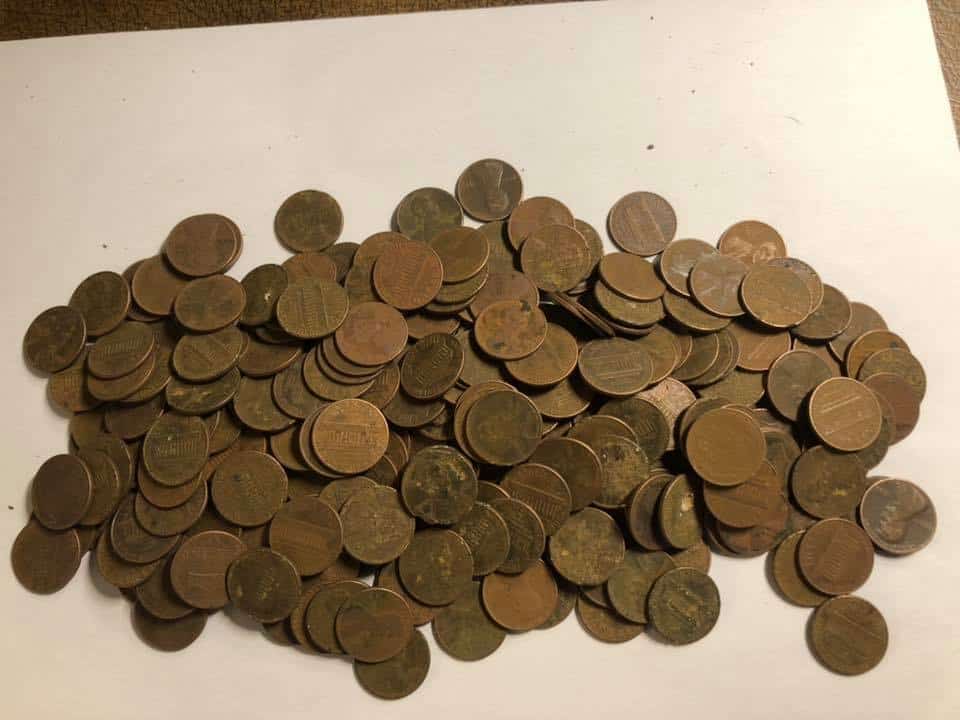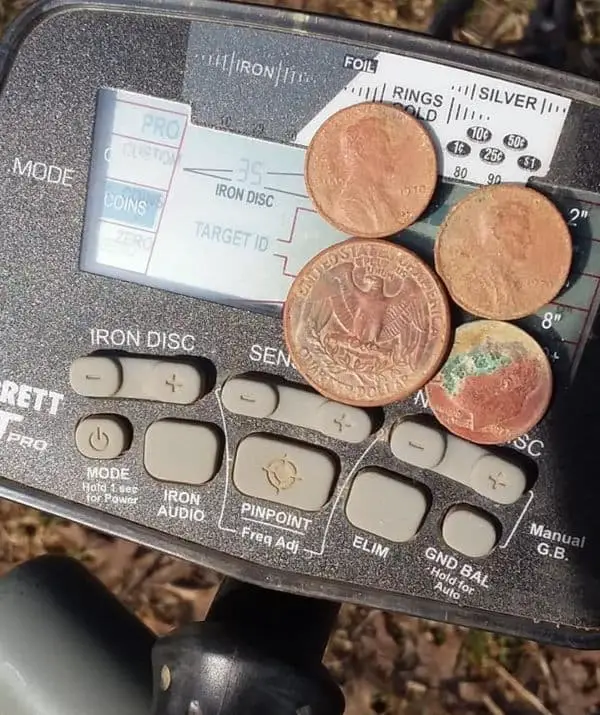
When I’ve started expressing interest about metal detecting, I’ve immediately fall in love with this hobby for whatever reason. Since then I didn’t stop asking all sorts of questions, even about the smallest details …
Each time I see an object made of a specific metal, I am like ‘can metal detectors detect this metal?! Indeed, I remember that I’ve asked this same exact question but about Brass! That’s why, I’ve decided to publish this Post and share with you what I’ve learnt …
So, do metal detectors detect brass? Brass has a fairly good electrical conductivity, which is better if you compare it to Tin or Iron. Its conductivity is similar to zinc. Consequently, when a metal detector emits an electromagnetic field any Brass object will react by triggering electric current. Thus, your machine will locate it precisely.
As a hobbyist, I can’t stress enough the importance of understanding the different types of metals and elements you may find during the process. By doing so, you will know immediately if any element you find or might find is detectable or not.
Furthermore, I will let you know about some easy tips to instantly identify Brass and how to properly clean it. In addition, I will include a proposition of a suitable machine if you want to detect more targets made from this metal …
More Interesting Information about Brass …
Unlike what many people might think, Brass is a very Old Metal. It was used for different purposes since prehistory. That’s why, this metal always remain a good target for detectorists.
In principle, Brass is an alloy (combination) between Zinc and Copper. These 2 metals are non-ferrous metals, thus brass is non-ferrous too. This means that it doesn’t stick to a magnet, even a strong one.
There are many other examples of non-ferrous metals such as mercury, aluminum, platinum, titanium, tungsten and Gold. Some of them are more valuable for hobbyists than others. Yet, all of them have properties making from them useful for industrial applications.
On the other hand, ferrous metals are those who have magnetic properties. Thus, if you run a magnet close to such a metal it is attracted to it. Iron being a famous example …
Modern metal detectors don’t only have the ability to detect all sorts of ferrous and non-ferrous metals including Brass. They also have the capability to tell you pretty accurately which metal you are about to dig for.
Best Metal Detector for Brass …

There are many new hobbyists who continue asking about a decent brass metal detector. Which seems such a legit request. Yet, there is no such a machine dedicated for this metal, however there are several devices that can do the job for you.
The main challenge here is discrimination. In other words, it happens many times that valuable brass targets are generally found between tons of trash.
That’s why in this case; you absolutely need a detecting machine with great capabilities for coins and jewelry. Plus the ability to discriminate junk metals, so you will save lot of time and energy as well.
Garrett AT Pro (You can Check it Right Here at Amazon!) remains a legit choice without a doubt. It is a great tool to detect all sorts of coins, jewelry and any valuable target mainly based on copper, bronze and brass and as well as other similar metals.
As I’ve said before, one of the main challenges that come with this hobby is digging lot of trash before finding something with a potential value. AT Pro is a discriminating genius …
In addition, you won’t worry too much about the kind of soil you are stepping foot in. Whether you are detecting in a forest, beach sands or saltwater or even in soaked, muddy ground you will continue noticing the same performances in term of depth and accuracy.
This device is a good option for new practitioners as it doesn’t represent a challenging learning curve. Plus, I believe that the price is well chosen and reasonable.
Furthermore Garrett AT Pro is used by a vast majority of people. So each time you have something wrong with your device, you could easily find somebody else in a Blog, Forum or on Youtube who has already experienced the same exact issue and what solution he has implemented!
Finally, if you are not a fan of Garrett Products, you can Have a Look at my Favorite Detection Machine Here at Amazon! It is a Minelab Product …
Can metal detectors detect Brass Knuckles?
Brass knuckles are a form of weapons that could be used during a hand to hand fight. Thus, the user could inflict lot of damage with a little to non-damage for his hands.
This weapon is considered as fantastic find for detectorists as it dates back to 3 centuries! It was the main arm used in US Civil war between 61 and 65 of the 19th century. There was another variation “Brass Knuckle knife” that was used in the WW1.
Due to its composition which is most of the time Brass, sometimes lead or even cast iron. These elements are all detectable. All you have to do is to pick the right place.
There were other knuckles made from wood. Soldiers who didn’t have the financial ability to buy one, use to craft knuckles from wood. Those are obviously not detectable …
How to identify brass metal?
I say this almost every time I write about a specific metal! Identifying metals is a must-have skill that you and all hobbyists should have. Otherwise, you may find something valuable and may end not collecting it, if you don’t recognize its value.
Now, for brass I will share with you few tips that you should consider to recognize it:
- Generally this metal develops a little layer on it over time. It is generally green colored, but it may have other colors depending on the acidity of the ground.
- Use a magnet. Indeed, if the supposedly brass object is attracted to the magnet, then you are either dealing with a different metal or plated brass.
- After cleaning the object, it should appear pretty yellowish. If it is grey, this probably means that it has higher zinc concentrations.
- Hit the brass object with another metal object or drop it on a solid ground. If you hear a mute sound, then it is probably not brass.
Brass and Bronze have very close composition, so how to tell if something is brass or bronze? You can try scratching the object. Brass will be easily scratched than bronze. In addition, you can try melting the object, actually brass melts faster than bronze. Also, you may want to visualize it under magnifying glass. You will notice that brass looks much more shiny than bronze.
Check more ideas on how you can easily identify your brass finds!
How to clean Brass Finds?
Cleaning finds is another crucial skill that you should master. Otherwise, you may be good enough to find valuable targets; however you might end up damaging them or not helping preserving them for a long time.
Let’s dive in some techniques that you should opt for for cleaning any brass object:
- Soap: In case your target is full of dirt (Of course it is the case!), you can soak it in warm soapy water for half an hour. Then, you can use a cloth or a toothbrush with soft bristles to clean the object even more.
- White Vinegar:It can be used not only to clean brass objects, but also to clean dentures! If you’ve got a grandma with false teeth, then yea, you can thank me later! Anyways, you can use it alone or you can mix it with salt (1 teaspoon) and flour to make a beautiful cleaning paste. Rub your find with the resulting mixture for 5 minutes up to 10 depending on how tarnished it is. Finally use warm water to wash the object before drying it.
- Lemon Juice:After you’ve cleaned the brass object properly, you can opt to turn it even shiny. Using lemon juice is an effective way to do it.
For more information about this Topic! You should definitely have a look at this Detection Coins Cleaning Tips! You will find out lot of ways to do it!
Valuable Brass Items you may find …
In most cases any object made of brass hold some value on it. Especially, considering the fact that this metal was used in several applications since prehistory.
That’s why, I would like to give you a little taste on some objects you may end up finding:
- Brass knuckles: I’ve talked about that a bit earlier in this Post, they were used for self-defense purposes since the 19th Not to mention that they were popular especially in WW1.
- Musical Instruments: Several are based on this metal. Just like harmonica, flutes, saxhorns, old relic bells, small handbells.
- Sculpturing: between the 7th and the 12th century, many civilizations were making lot of statutes based on this metal. Roman and African civilizations were all notorious for that. It would be very rare to find that these days, yet you never know. Everything was not possible until it happens.
Brass coin probe metal detecting
It is an old school technique that you can use not only to locate coins and other metallic object. But also and most importantly to be able to extract it without doing much damage to the grass.
This video below explains that very clearly …
Can brass be magnetized?
There are some products marketed and sold as being Brass based like a vase for example. Yet, when you check it you notice that it’s attracted to a magnet.
As I’ve explained before, this should not happen as Brass is an alloy made from copper and zinc. None of these 2 metals is magnetic, so is brass.
In this case, there are 2 or 3 options that could explain that:
- The object may be based mainly on a ferrous metal like steel, and only plated with Brass.
- It could be made of brass but electroplated by nickel.
- Or you may be dealing with a so-called “second degree brass”. That is a copper, zinc and iron alloy. For me, in this case, such an alloy should not even be called brass by any means.
So, what I could say is that this metal could not be magnetized. Otherwise, you will change its conventional composition!
Conclusion
To be honest, I wasn’t going to write this Post at the beginning … I didn’t think that there is much value to be shared. Yet, after noticing that the questions I’ve answered in this Post are still asked to this date, I thought I probably should change my opinion …
Indeed, I’ve spent 3 days writing this Post, Hopefully You’ve learnt something new!
By the way, have you ever found anything made of Brass before? If so, let me know what it is in the comment section right below …
… Finally, if you want to learn about more valuable items to find, you can check this Platinum Detecting Post! You will find out some good info in there …
